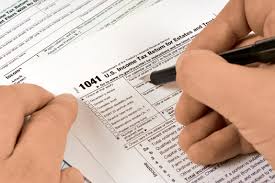Income Taxes for Estates and Trusts
 Estates and trusts are taxed on income they earn, just like individuals. Assets (stocks, bonds, rental property and other interest- and dividend-producing assets) owned by an individual become part of the estate upon their death. Income generated by these assets must be reported to the IRS by the trust or estate. Estates and trusts pay taxes based on rates set by the IRS each year.
Estates and trusts are taxed on income they earn, just like individuals. Assets (stocks, bonds, rental property and other interest- and dividend-producing assets) owned by an individual become part of the estate upon their death. Income generated by these assets must be reported to the IRS by the trust or estate. Estates and trusts pay taxes based on rates set by the IRS each year.
Which Estates and Trusts Must File a Form 1041?
The following estates are required to file Form 1041:
- Estates with gross income of $600 or more for the tax year
- Estates with a beneficiary who is a nonresident alien
The following trusts are required to file Form 1041:
- Trusts that have any taxable income at all
- Trusts that have a gross income of $600 or more regardless of taxable income
- Trusts with a beneficiary who is a nonresident alien
An estate must obtain a tax ID … Read More




